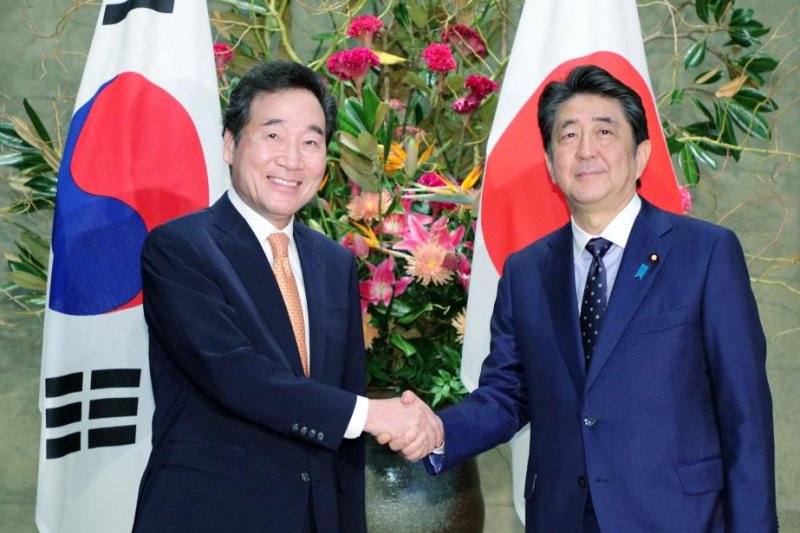South Korean Prime Minister Lee Nak-yon (L) shakes hands with Japanese Prime Minister Shinzo Abe (R) prior to their meeting at Abe's official residence in Tokyo on Thursday. Photo by Jiji Press/EPA-EFE
Oct. 24 (UPI) -- South Korea and Japan agreed Thursday to improve prickly ties during a meeting between two prime ministers, in what could be the beginning of a major reversal of protracted tensions.
South Korean Prime Minister Lee Nak-yon said Thursday following a 20-minute meeting with Japan's Shinzo Abe the two sides agreed conflict should be resolved through dialogue, South Korean news service Newsis reported.
"The sporadic and informal dialogue between diplomatic authorities will now become formalized," Lee told South Korean reporters following the meeting with Abe. "From now on, we can probably expect [dialogue] to speed up."
During the meeting that exceeded the expected 10 minutes of discussion, the Japanese prime minister said South Korea and Japan are "important to each other," Japan's foreign ministry said.
"Korea-Japan relations are at a critical stage at present, but we should not neglect important Korea-Japan relations," Abe said, according to the ministry.
Abe also said he hoped the two sides would restore "healthy relations" by sticking to promises, according to South Korean news service News 1.
Tensions between Seoul and Tokyo reached a climax in the summer, when Japan placed retaliatory trade restrictions against Korea, citing "lack of trust." Experts have said Japan was reacting to a South Korean court decision that ordered Japanese firms like Mitsubishi to compensate Korean victims of wartime forced labor.
Japan also removed South Korea from its "white list" of preferred trading partners; Seoul responded with a decision to not renew a military intelligence-sharing agreement, GSOMIA, in November.
On Thursday, the specific issues were not addressed, but Abe signaled an interest in resolving the problems through cooperation.
"In these times, the exchange between members of parliament and the people, particularly youth and region-to-region exchanges, are more important," Abe said.
The South Korean prime minister delivered a letter from President Moon Jae-in on Thursday. Lee also expressed condolences for the damage caused by Typhoon Hagibis, Japan's foreign ministry said.
Japan's typhoon death toll is 84, according to NHK on Thursday.















